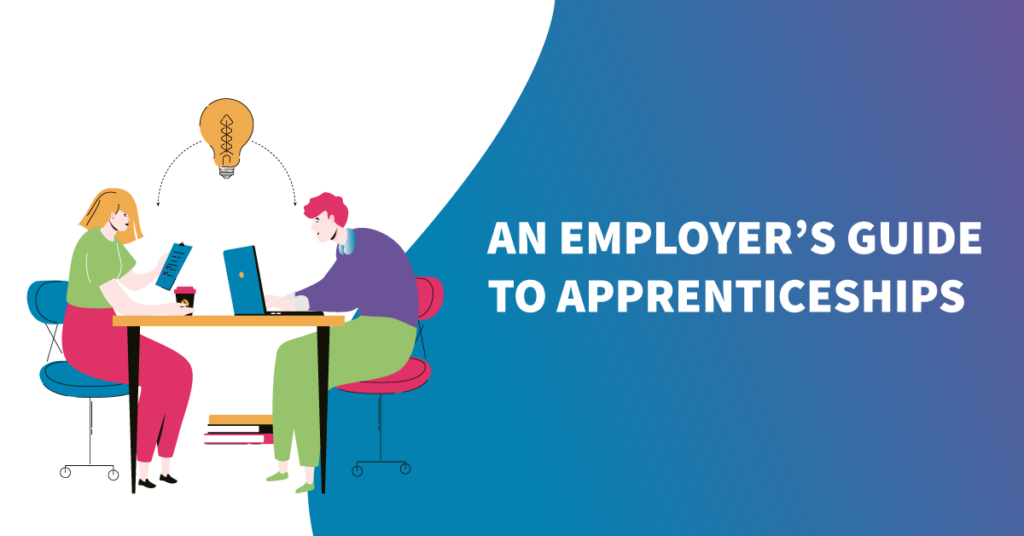
Some employers are still on the fence about hiring an apprenticeship. One reason they may not take on an apprenticeship is that they don’t fully understand the commitments that come with hiring one. We have put together a handy guide to apprenticeships to answer some of the most common questions employers may have.
Introduction to Apprenticeships
What is an apprenticeship?
An apprenticeship combines work and study to help individuals advance in their chosen careers. It is a great educational choice for any age as it provides people with work experience as well as recognised qualifications.
Many young people choosing to go to college or university find themselves struggling when it comes to work experience. Many employers expect at least some form of experience, which is why an apprenticeship is a valuable choice for a lot of people.
How do they work?
To ensure apprentices are learning during their apprenticeship programme, they are required to use 20% of their time on off-the-job training. Off-the-job training means time away from their usual tasks to learn new skills and knowledge. The remaining 80% is on-the-job training, which means they will continue to complete their everyday duties and learn on the go.
Off-the-job training is delivered according to the apprenticeship provider. At The B2W Group, we dedicate weekly training blocks in our Manchester or Rotherham classrooms that learners attend to work towards their unit qualifications. During the 18-month programme, we deliver the following blocks:
Training and Development – 4-day block
Induction and Initial Assessment – 1 day
Digital Marketing Business Principles – 4-day block
Principles of Marketing – 4-day block
Principles of Coding – 8-day block
Apprentices also complete off-the-job training in their normal place of work, and this can be activities such as shadowing, practical training, mentoring and attending competitions.
Apprenticeship Levels
Apprenticeships are available at different levels to ensure suitability for the candidate. The levels are equivalent to different qualifications:
Intermediate Level 2 – 5 GCSE passes
Advanced Level 3 – 2 A level passes
Higher Level 4, 5, 6 and 7 – Foundation degree and above
Degree Level 6 and 7 – Bachelor’s or master’s degree
Information about Candidates
Who can complete an apprenticeship?
An apprenticeship is available to individuals over the age of 16 who spend at least 50% of their working hours in England over the duration of their apprenticeship. They must also not be in full-time education if they want to take part in an apprenticeship.
Apprenticeships aren’t just for new starts, they can also be used to upskill existing staff to grow talent among current employees.
What if the candidate has a university degree?
With the introduction of the apprenticeship levy, the Government changed rules on previous learning and also introduced higher-level apprenticeships more suited to candidates that have already completed a university degree. Those leaving university may now be able to complete an apprenticeship at a higher level than their degree.
They are also now eligible for Government funding, resulting in more employers taking graduates onto an apprenticeship scheme.
Graduates can also be funded on a lower level apprenticeship, as long as the programme is non-relevant to their degree. For example, if they did a language degree, they would be able to be funded for a lower-level marketing degree as the two aren’t related.
How much do I need to pay them?
Currently, the minimum wage for an apprentice is £3.90 per hour. As of April 2020, this will be increasing to £4.15 per hour. Keep in mind that apprentices must work at least 30 hours per week (and a maximum of 40) to qualify for their apprenticeship.
Although not necessary, many employers pay more than the minimum apprenticeship wage to their apprentices.
Paying apprentices who are 19+
After the age of 19, their wage will differ. If a candidate is starting an apprenticeship at the age of 19 or over, they will receive the minimum apprenticeship wage (£3.90 or £4.15 after April 2020) for the first 12 months of their apprenticeship. After this, you will be required to pay them the national minimum wage for their age.
Employee rights as an apprentice
An apprentice will have the same employee rights as anyone else that you employ. This means that they will receive a regular wage, be entitled to holidays, fair working hours and rest breaks.
Holidays
Apprentices are entitled to at least one and half days’ paid holiday for every month of training. They should receive the same standard holiday that your other employees earn under their contract.
Fair Treatment
Apprentices have the right to be treated fairly in all aspects of work. This means that as well as being paid regularly, being given holiday and not being made to work too many hours, apprentices should not face any discrimination or danger.
Rights include adequate health and safety training and prevention. They also include being able to work happily without being discriminated against for race, religion, age or gender.
Am I obliged to keep them on after they complete the apprenticeship?
No, you are not obliged to continue the employment of an apprentice once they have completed their apprenticeship. You will be able to review at the end and let them know if you will be keeping them on as a full-time employee or want to put them onto another higher level apprenticeship.
Many employers choose to keep their apprentice on as they recognise they are a valuable member of their team.
The benefits of hiring an apprentice
Bring new ideas into the workplace
Apprentices will bring new ideas and ways of working into your business. They will be inspired to try new things and implement new skills that they’ve learned in the classroom.
Provide individuals with a kickstart in their career
An apprenticeship provides an opportunity for people that want to start their new career. By hiring an apprentice, you are helping them develop their skills and knowledge and providing the relevant experience for them to move up in their careers.
Increased Productivity
More than three-quarters (76%) of employers who hire an apprentice agree they make their workplace more productive.
Apprenticeship Fees
What fees do I need to pay to hire an apprentice?
All UK employers with a pay bill of over £3 million per year pay the apprenticeship levy. The levy is set at 0.5% of the value of the employer’s pay bill, minus an apprenticeship levy allowance of £15,000 per financial year. The funds generated by the levy have to be spent on apprenticeship training costs. The government tops up the funds paid by the employer by 10%.
Since May 2017, apprentices on apprenticeship frameworks and apprenticeship standards have been funded in the same way. Employers who pay the apprenticeship levy will pay for their training costs from their levy funds, while employers who do not pay the levy will generally pay 10% of the cost of training with the government contributing the remaining 90%. The government will provide additional payments, mainly targeted at younger apprentices.
A full description of the funding changes and the apprenticeship levy is available in the library briefing note Apprenticeships and Skills Policy in England.
(source: www.parliament.uk/commons-library)
Are there any recruitment fees?
Using The B2W Group means there are no recruitment fees. We advertise the role, and find and place suitable candidates. Once we have received and reviewed the applicant’s CVs, we will filter the candidates by screening and vetting them to ensure they are the right fit for your role. We will then arrange the interviews between you and the candidates.
Level 3 Digital Marketer Apprenticeship
We offer the Level 3 Digital Marketer Apprenticeship in the North West and South East areas. Our offices are carefully placed in key locations in Manchester and Rotherham to provide easy access to our learners.
During the 18-month programme, learners will gain an understanding of digital marketing skills, including SEO, social media management, effective campaign building, and basic coding.

